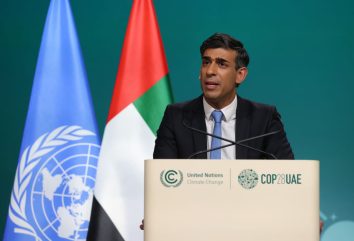
Although the UK has a strong track record of climate action, having set a net-zero target as far back as 2019, the current government has not brought forward enough policy for the UK to meet its climate goals. Recent domestic policy decisions have sent mixed signals to the international community and put at risk the UK’s 2030 nationally determined contribution (NDC) – its emissions reduction pledge under the Paris Agreement – and its Sixth Carbon Budget, according to a new report from the CCC, the country’s independent adviser on tackling climate change.
“We are doing alright on the energy front, but outside of that, we need to quadruple the pace of change,” Professor Piers Forster, the CCC’s interim chair, tells Energy Monitor. “We really have to get going.”

The UK Government had a strong presence at COP28, with the country co-leading consultations on the Global Stocktake negotiations, but its underwhelming recent progress on tackling climate change served to undermine its role at the conference, alleges the CCC’s latest report. “It was a bit of chalk-and-cheese for the UK Government at COP28,” says Forster. “There were some big financing pledges and some important leadership in the negotiations, but the UK’s influence isn’t what it was – other countries are starting to doubt our credibility.”
Prime Minister Rishi Sunak’s now-infamous net-zero speech in September 2023, and government decisions to go ahead with a new coal mine and to license out new oil and gas production in the North Sea, have contributed to a perception among the international community that the UK is backpedalling on its climate goals, states the report. This is despite some important recent advances in climate policy by the Sunak government, including its Zero Emissions Vehicle Mandate, more financial support for the Boiler Upgrade Scheme and a commitment to a new Carbon Border Adjustment Mechanism.
“The Sunak government is doing stuff; it is more of a problem of signalling,” says Forster. “There is not a great deal of difference with the Johnson government on action, but there is a big difference in the way they communicate about it. It is important though, to communicate the benefits of net zero and take the public with you on that journey – the overall cost of net zero is less than 1% of gross domestic product, and it could even save money if you factor in the normal infrastructure that will need replacing in the meantime. It also sends mixed messages to the international community and puts international businesses off investing in the UK.”
There are a number of actions the government needs to take to ensure the UK’s domestic policy is consistent with the language the country signed up to at COP28, according to the research. The first is stepping up the deployment of renewables. There is uncertainty around the timescales of the country’s renewables deployment. Despite being the cheapest forms of generation, solar and onshore wind are progressing too slowly because of barriers around planning and consent as well as access to network connections, says the climate advisory body.
The 2023 contracts for difference (CfD) auction round also failed to procure any new offshore wind capacity. Nonetheless, the government has recently published the Connections Action Plan and Transmission Acceleration Action Plan to speed up the delivery of energy infrastructure; the CCC believes the implementation of these is a priority for the UK to meet its climate goals. The government has also increased the price ceilings for all technologies in the next CfD auction round in 2024, including a 66% increase to the offshore wind price ceiling. A solar deployment road map expected in 2024 and recent changes to planning rules for onshore wind also have potential to bring deployment trajectories back on track, according to the report.
“There has definitely been some progress made on renewables recently, and there have been some good noises coming from the Labour Party too,” says Forster. “The CfDs could even be more effective than the Inflation Reduction Act’s subsidies in the US; they are more technology agnostic, rather than picking winners like the IRA does.”
The UK also needs to limit its expansion of fossil fuel production, assert the researchers. If every country with fossil fuel reserves were to increase production, the goals of the Paris Agreement would become unachievable. The UK Government must lead by example and align policy on future oil and gas production with COP28’s Global Stocktake calls to accelerate the transition away from fossil fuels, states the analysis.
As for climate adaptation, the country’s current National Adaptation Programme (NAP3) does not live up to the standards of the new Framework for the Global Goal on Adaptation: NAP3 is not explicitly gender-responsive, did not go through consultation, does not include additional commitments for public engagement, and does not include a monitoring and evaluation system. The government should update NAP3 within the current policy cycle, advises the CCC.
Despite the UK’s global advocacy on reforestation and afforestation, its rates of domestic tree planting and peatland restoration are also lagging and urgently require expediting to help the country reach its emissions reduction targets, add the researchers.
“We are also really behind the curve on agriculture,” says Forster. “After Brexit we had a huge opportunity to come up with a whole new set of agricultural standards to optimise for biodiversity, food security and climate. But DEFRA [Department for Environment, Food & Rural Affairs] has been so slow to introduce them – particularly financial support for farmers. The farming community feels incredibly disenfranchised as a result, and it may not be long before we see the kind of farmer protests that are going on in France and the Netherlands. Tractors in Westminster aren’t far off.”
The UK is also falling behind on its efforts to curb methane emissions. These emissions predominantly derive from the country’s agriculture and waste sectors, although some are related to fuel supply and land use. According to the CCC, the country must commit to reducing methane emissions by 30% by 2030 against a 2020 baseline. Policy-wise, this could involve setting a target to capture a proportion of landfill methane emissions, shifting to low-carbon agricultural practices and lowering ruminant livestock numbers, and strengthening targets for methane flaring and venting, suggest the authors.
“We are actually doing pretty well cutting methane emissions coming from gas-infrastructure leakages and landfills; what’s left is methane emissions coming from agriculture,” says Forster. “But the government doesn’t like talking about methane because they don’t have many policies for reducing methane from agriculture – such as dietary changes.”
In 2024, the UK Government will need to continue addressing the delivery gaps in its 2030 NDC, while determining the level of ambition for 2035. The CCC’s 2023 Progress Report revealed that to achieve its 2030 climate goals, the rate of the country’s annual emissions reduction outside electricity supply must almost quadruple from 1.2% to 4.7%. “Now is the time for the government to really accelerate its climate action,” concludes Forster.



